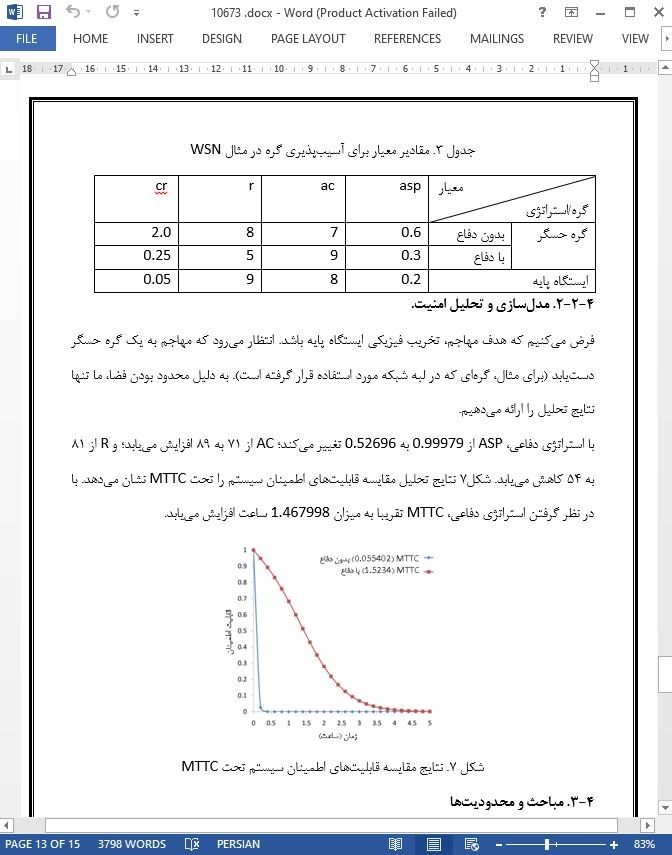
چهارچوبی برای مدل سازی و ارزيابی امنيت اينترنت اشيا
چکيده
اينترنت اشيا (IoT) کاربردهاي خلاقانه اي را در حوزه هاي مختلف، امکان پذير ساخته است. با توجه به ساختار ناهمگون و مقياس وسيع آن، اين اينترنت موضوعات امنيتي جديد بسياري را مطرح مي سازد. براي اشاره به مشکل امنيتي، چهارچوبي را براي مدل سازي و ارزيابي امنيتي IoT ارائه مي دهيم. اين چهارچوب در ايجاد مدل هاي امنيتي گرافيکي براي IoT کمک مي کند. به طور کلي، اين چهارچوب شامل پنج گام براي يافتن سناريوهاي حمله، تحليل امنيت IoT از طريق معيارهاي امنيتي به خوبي تعريف شده و ارزيابي تاثير استراتژي هاي دفاعي، مي باشد. مزاياي اين چهارچوب از طريق مطالعه دو شبکه IoT نمونه، مطرح مي شوند. با استفاده از نتايج تحليل، توانايي هاي چهارچوب پيشنهادي را در کاهش تاثيرات حملات احتمالي و ارزيابي امنيت شبکه هاي ابعاد وسيع، نشان خواهيم داد.
1. مقدمه
در اينترنت اشياء (IoT)، هر شي فيزيکي قابليت تعيين محل، آدرس دهي و دستيابي را در دنياي مجازي، به دست مي آورد [1]، [2]، [3]. انتظار مي رود که IoT شامل ميليون ها يا ميلياردها شيء باشد که با يکديگر و با ساير موجودات (براي مثال، انسان ها) در ارتباط باشند. به دليل پيچيدگي ذاتي و ويژگي ناهمگون بودن، IoT با تهديدها و حملات متعددي روبه رو شده است که تاثيري منفي بر روي کارايي طبيعي آن مي گذارند. بنابراين، حفاظت از امنيت IoT امري پيچيده و دشوار خواهد بود.
5. نتيجه گيري
مدل سازي امنيت IoT، امري پيچيده است. چرا که IoT از تعداد زيادي گره هاي ناهمگن و متحرک تشکيل مي شود. در اين مقاله، چهارچوبي را براي مدل سازي و ارزيابي امنيت IoT ارائه کرده ايم که پنج گام زير را شامل مي شود: 1) پيش پردازش، 2) توليد مدل امنيت، 3) تصويرسازي و ذخيره سازي، 4)تحليل امنيت، و 5) تغييرات و به روزرساني ها. در اين چهارچوب، يک توليد کننده IoT، يک توليد کننده مدل امنيت و يک ارزياب امنيت را ايجاد کرده ايم. دو مثال از شبکه هاي IoT ارائه شدند تا توانايي هاي اين چهارچوب در کاهش تاثير حملات بالقوه و اشاره به مسئله مقياس پذيري را به نمايش بگذارند.
Abstract
Internet of Things (IoT) is enabling innovative applications in various domains. Due to its heterogeneous and wide scale structure, it introduces many new security issues. To address the security problem, we propose a framework for security modeling and assessment of the IoT. The framework helps to construct graphical security models for the IoT. Generally, the framework involves five steps to find attack scenarios, analyze the security of the IoT through well-defined security metrics, and assess the effectiveness of defense strategies. The benefits of the framework are presented via a study of two example IoT networks. Through the analysis results, we show the capabilities of the proposed framework on mitigating impacts of potential attacks and evaluating the security of large-scale networks.
1. Introduction
In the Internet of Things (IoT), every physical object becomes locatable, addressable and reachable in the virtual world [1], [2], [3]. The IoT is supposed to contain millions or billions of objects which will communicate with each other and with other entities (e.g., human beings). With the inherent complexity and heterogeneous feature, the IoT has faced numerous threats and attacks that will negatively affect its normal functionality. Thus protecting the security of the IoT becomes a complex and difficult task.
5. Conclusion
Modeling security of the IoT is a complex task as the IoT is characterized by a large number of heterogeneous and mobile nodes. In the paper, we have presented a framework of modeling and assessing security for the IoT which encompasses five steps: i) preprocessing, ii) security model generation, iii) visualization and storage, iv) security analysis, and v) changes and updates. In the framework, we have developed an IoT Generator, a Security Model Generator and a Security Evaluator. Two example IoT networks were provided to demonstrate the capabilities of the framework on mitigating impacts of potential attacks and addressing the scalability problem.

چکيده
1. مقدمه
2. کارهاي مرتبط
3. چهارچوب پيشنهادي
4. ارزيابي
4-1. مثال WBAN
4-2. مثالي از WSN
4-3. مباحث و محدوديت ها
5. نتيجه گيري
Abstract
1. Introduction
2. Related Work
3. The Proposed Framework
4. Evaluation
4.1. An Example WBAN
4.2. An Example WSN
4.3. Discussions and Limitations
5. Conclusion
- اصل مقاله انگلیسی با فرمت ورد (word) با قابلیت ویرایش
- ترجمه فارسی مقاله با فرمت ورد (word) با قابلیت ویرایش، بدون آرم سایت ای ترجمه
- ترجمه فارسی مقاله با فرمت pdf، بدون آرم سایت ای ترجمه
